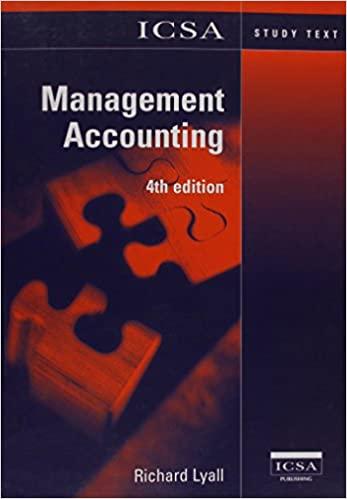Question
Problem 1 (25 points) Mainstreet Company is a subsidiary of Howard Corp. The controller believes that the yearly allowance for doubtful accounts for Mainstreet should
Problem 1 (25 points)
Mainstreet Company is a subsidiary of Howard Corp. The controller believes that the yearly allowance for doubtful accounts for Mainstreet should be 8% of gross accounts receivable. Given the recession and the high interest rate environment, the president, nervous that the parent company might expect the subsidiary to sustain its 10% growth rate, suggests that the controller increase the allowance for doubtful accounts to 9%. The president thinks that the lower net income, which reflects a 6% growth rate, will be a more sustainable rate for Mainstreet Company.
Instructions
(a) In a recessionary environment with tight credit and high interest rates:
1. Identify steps Mainstreet might consider to improve the accounts receivable situation.
2. Then evaluate each step identified in terms of the risks and costs involved.
(b) Should the controller be concerned with Mainstreets growth rate in estimating the allowance? Explain your answer.
(c) Does the president's request pose an ethical dilemma for the controller? Give your reasons.
Problem 2 (25 points)
Toni Inc. purchased a warehouse in a downtown district where land values are rapidly increasing. James Carpenter, controller, and Betty Ankrah, financial vice president, are trying to allocate the cost of the purchase between the land and the building. Noting that depreciation can be taken only on the building, Carpenter favors placing a very high proportion of the cost on the warehouse itself, thus reducing taxable income and income taxes. Ankrah, his supervisor, argues that the allocation should recognize the increasing value of the land, regardless of the depreciation potential of the warehouse. Besides, she says, net income is negatively impacted by additional depreciation and will cause the company's stock price to go down.
Instructions
Answer the following questions.
(a) What stakeholder interests are in conflict?
(b) What ethical issues does Carpenter face?
(c) How should these costs be allocated?
Problem 3: (25 points)
Gerald Pryor, Beezer Corporation's controller, is concerned that net income may be lower this year. He is afraid upper-level management might recommend cost reductions by laying off accounting staff, including him.
Pryor knows that depreciation is a major expense for Beezer. The company currently uses the double-declining-balance method for both financial reporting and tax purposes, and he's thinking of selling equipment that, given its age, is primarily used when there are periodic spikes in demand. The equipment has a carrying value of $2,000,000 and a fair value of $2,180,000. The gain on the sale would be reported in the income statement. He doesn't want to highlight this method of increasing income. He thinks, Why don't I increase the estimated useful lives and the salvage values? That will decrease depreciation expense and require less extensive disclosure, since the changes are accounted for prospectively. I may be able to save my job and those of my staff.
Instructions
Answer the following questions.
(a) Who are the stakeholders in this situation?
(b) What are the ethical issues involved?
(c) What should Pryor do?
Step by Step Solution
There are 3 Steps involved in it
Step: 1

Get Instant Access to Expert-Tailored Solutions
See step-by-step solutions with expert insights and AI powered tools for academic success
Step: 2

Step: 3

Ace Your Homework with AI
Get the answers you need in no time with our AI-driven, step-by-step assistance
Get Started


